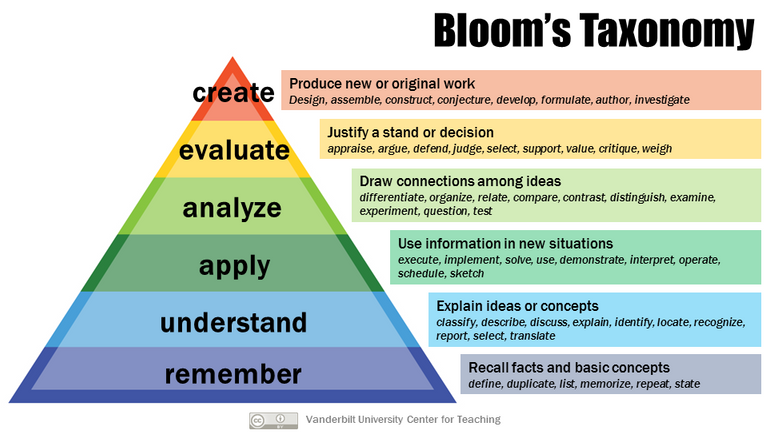Greetings Steemit and newly forming #higherorderthinking communities!
@rortian [Mike] and I would like to invite you to our exploration of how we can learn from each other when strangers choose to have a completely open conversation about thoughts and fears. Think of it as a philosophical—or is it a psychological?—experiment into thinking and learning.

Bloom's Taxonomy by Center for Teaching Vanderbilt University
The backstory
On April 1st, Mike wrote a post titled, “To steemstem or not to steemstem: Who defines science?”, where he expressed his experiences with a lack of comments on his first Steemit posts and an unsettling [my words, not his] Discord message about how his posts were not “scientific” enough for #steemstem. Understandably so, being an educated man, he turned to the community and asked, “is there a standard definition of science that I should follow, something that’s authoritatively dictated by some stemsteemites?”
Mike’s follow-up question came deeper in the post after he shared his credentials in the field of philosophy of science and ethics and talked about his dissertation on a pedagogical model for higher order thinking. He asked of us, “Is steemstem strictly about research in science, or does it also engage in topics which are relevant (perhaps even important) to scientists??
“If deep critical thinking and the development of broadly coherent networks of aren't of interest to steemstemites, then I won't use the tag. Maybe I’ll find someone who wants to talk about my stuff; maybe I won’t. I have no way to tell.”
If you have not read the post, I encourage you to do so—including the comments—to feel for yourself the impact of Mike and the comment writers. It is the comments that brings us together here.
From questions to…
Over the next days, in the comments of that post, Mike and I explored tone, meaning, the “possible” separation between thoughts and action, and intention vs. reception.
Look, I don’t want to lie to you. As I told Mike directly, I read many of his posts, but didn’t feel comfortable replying. I am an avid commenter, often commenting more than I post. If I don’t comment on something I read, it is either because I:
didn’t understand it,
found it to be superficial or plagiarized, or
didn’t feel I had the depth of knowledge necessary to respond at the level it deserved.
But if I am really honest with myself, and in turn with you, there is a fourth hidden reason: I also don’t answer if I feel like the writer is not open to the response because differing opinions are not welcome, overconfidence in the subject matter to the point of seeing everyone as less educated, or the feeling that it was written only to hear the praise of others.
When it came to Mike’s posts, the impact of his words hit me between 3 and 4.
So why did I respond?
Each of us has our perceived strengths and weaknesses. My major weakness is that I am only recently stepping back into academia after a long pause and a completely different background, so writing scientific papers and the academic jargon for the subjects I am studying are still not fluid. On the flip side, I have extensive experience in public speaking, facilitating community discussions, and project management in a wide range of industries from high-tech to low-tech. When it comes to taking judgment out of the equation and talking strictly about how behaviors are perceived/received, I have been told I have a way with carefully crafting words. Plus, I am not afraid to reveal my own flaws, even publicly, even if my fear is having others publicly see my flaw!
All his is great, but why are we here?
Mike and I decided to dig deep into our psyches and try to make heads or tails of our various mechanisms when it comes to the implied and inferred emotion between the written word. He wants to explore my “avoidance” and I want to explore the “fine line between justifiable confidence and arrogance”.
And so it begins…
First Topic: Avoidance

I Can’t See You…, by Peter
Mike asks:
So I requested that you examine your avoidance; avoidance is a very common phenomenon.Obviously it's often associated with fear. Of course we can justify it cognitively without reference to bad feelings, but feelings and ideas are inextricably intertwined; they're concurrent and interdependent; I'm told that many neural pathways are common to both...
And we're all carrying all our emotions all the time; they never go anywhere but on or under the surface of our consciousness.
So if your avoidance signaled a fear reaction (either conscious or repressed), what might you be afraid of?
I'm harmless, aren't I? If not, please inform me of the danger that I might pose 'cause I'd want to fix it if I could.
If you're not afraid of me, then there's probably something in your history which conflicts with your commitment to communication that you don't want to experience, usually bad feelings and bad thoughts, associated with a concern (euphemism!) that something bad will happen. If that's the case then I'd ask you to identify the feelings, the thoughts and the concerns (introspection/self-examination, essential to metacognition).
The worst difficulties occur when we believe that our bad thoughts are true! If we don't then progress is possible. Bad thoughts and bad feelings make for a bad combination.
We all suffer conflicts.
My answer:
It has taken me a while to untangle why I did not respond to any of your original posts, Mike. I didn’t see them before your #steemstem post, so it would not have changed the outcome. I went through all of them after, and I still didn’t comment. Why is that? Was it a form of avoidance?
You could say that there were three different parts to the reason behind my [lack of] response:
- Too many words, not enough understanding
- Perceived lack of knowledge
- Aversion to the perceived tone
I don’t understand
As I have said before, I am only now entering into the formal world of philosophy and psychology. While these have always been favorite concepts, my schooling is in math, engineering, and the arts. I have not followed the great thinking minds of our times by name. I am seen as a philosopher because of the way I think about a given problem space, but I have absolutely no education in the structural breakdown of a given approach. You could say I ruminate about topics that interest me, exploring their nuances as far as my mind can go, which does not make me qualified to have a philosophical debate about philosophy itself.
Mike, you are highly educated in this area and your writing reflects that. I tried to follow you, but there were times when the stream of fancy words and specialized jargon became too much for my brain to follow. At times I thought I understood where you were going, but the threads were so fragile they easily broke before I could reach a conclusion, much less formulate a response.
To be perfectly honest, I wasn’t sure if I really understood the argument you wanted to make. With topics that dense, I prefer shorter posts so I can fully grasp the implications of what you are presenting. A comment asking for a layman’s description seemed out of place, but maybe that is just “fear” of looking like an uneducated fool. This is what we will explore in the next section.
I should admit that this is a response I have often. Even in topics of great interest, if the logic used is outside of my comfort zone, I tend to avoid. I may read a paragraph here, then leave it for a week, only to come back to it later hoping my experiences unlock another level of understanding. I have research papers that I have been reading for over a year one or two paragraphs at a time, discovering that the incomprehensible is slowly become comprehensible with each attempt.
Fear of not living up to the expectation
While I feel at ease with the general concepts and threads you make, I just don’t have the education to engage in any kind of in-depth, technical commentary. And without being able to cite the proper thinkers and terminology, I fear being labeled uneducated or dismissed for not understanding the implications of the argument. As such, I consciously choose to lurk in the shadows like a child sitting under the table listening to adult discussions in the hopes of learning something new or discovering concepts that I can research on my own.In essence, I am afraid of your dismissal the same as I am afraid of the disappointment by someone who discovers I am illiterate in an area where I was thought to be knowledgeable. How is that for a childhood trauma to analyze?!
Let me make it simple for you: I have always been a quick learner, and with brothers that are much old than myself, I often knew things beyond my grade level. Add to that a relentless inquisitiveness, and you have a person that knows a little about a lot of things. This makes me an excellent visionary. But when it comes to going deep into one topic, I lack the knowledge base possessed by a subject matter expert. Given how much we value Wikipedialike knowledge in society [and how women are not often recognized as visionaries, but I leave that for another comment], I fear being labeled a fraud because I do not have the depth others expect me to have.
I know this about myself, so I stay out of discussions where these dynamics can come into play.
A very quick aside: I do not have this problem when I speak. There, I am able to navigate my lack of depth using completely different skills. I think the difference comes in the use of empathy to compensate for my lack of depth. I feel quite comfortable hooking into the emotional component of an argument and using metaphors from different competencies to make my point. If we had been speaking, I would have commented.
Reading Between the Lines
This last point is the most difficult to make, because it I have to choose my words very carefully to avoid any judgment or misinterpretation of tone. I apologize in advance if it does not come out correctly. Let’s make a pact to believe that each of us has the best of intentions, therefore ask questions before making snap judgments. Agreed?When I first read your posts, two things came to mind. 1. I felt you were a Mr. Know-it-all, and I wondered what you wanted to accomplish. If you are convinced that people do not want to engage in these topics, then why write about them? Later one when I read your own words stating that no one wants to engage with you, I could see the matrix you created. It felt, and again this is my my personal feeling, like you wrote in such a way as to purposefully alienate people in order to use their lack of response as a justification of your own belief. In other words, you rigged the game in your favor.
Why did I pick up on this? Because very early in my career, I did the same thing. I was so convinced that no one wanted to engage in the debate I wanted to have that I did not recognize that my own writing was preventing the debate. Lucky for me, I had some wonderful mirrors that helped me open my writing style and invite others into the discussion. I added more questions and included phrases like “in my opinion” and “I think” more often to show that my statements were not absolutes, but opinions open to scrutiny. It is easy to ask a leading question, such as you used when you said, “I’m harmless, aren’t I?”. I would have written, “Do I seem harmful or harmless, what do you think?” These tell the reader that there is space for discussion and invites them to engage.
In your comment quoted above, you leave space for only one answer: that avoidance is caused by fear. There is no space for any other opinions. But as you can see by my lengthly response, there is more than just fear at play.
Taking the example of,
So if your avoidance signaled a fear reaction(either conscious or repressed), what might you be afraid of?”
You embedded the answer you want into the very question: that my avoidance was signaled by fear, and nothing more. Maybe you could have written something like, “Could your avoidance have been a fear reaction (either conscious or repressed)? If so, what might you be afraid of? What else could have caused the avoidance?”
Even if I arrive at the same fear conclusion, it would be based on my personal evaluation of the situation, not by your implication. These puts me at ease and makes me want to engage in the discussion.
Continuing on,
If you're not afraid of me, then there's probably something in your history which conflicts with your commitment to communication that you don't want to experience, usually bad feelings and bad thoughts, associated with a concern (euphemism!) that something bad will happen.
Can you see that there is no room here for my own interpretation, as you have already concluded that if I am not afraid of you, you know where the fear comes from?
I could go line by line if you think it would be helpful. Overall, if the goal is to create discussion, I feel it could be much more effective if you use more open-ended question throughout and integrate more doubt into your writing. Because if there is no doubt, then what are we here to discuss?

Discussion, by Petras Gaglias
I hope this exchange is useful to you and to anyone else that is reading. I welcome any insight, questions, and/or challenges to what I have written. If I made any errors in my quotes or you feel there is a flaw in my argumentation, please let me know and I will happily correct or explain them.
As a next step, Mike, I would love to hear more about your own interpretation of your writing style.
Be a part of the conversation: Comments Welcome!
and resteems… or start a conversation of your own with #higherorderthinking!
Everything above, except for direct quotes, is my personal opinion and for the sole purpose of opening a fluid exchange that will lead to growth.


Congratulations @yvesoler! You have completed some achievement on Steemit and have been rewarded with new badge(s) :
Click on any badge to view your own Board of Honor on SteemitBoard.
To support your work, I also upvoted your post!
For more information about SteemitBoard, click here
If you no longer want to receive notifications, reply to this comment with the word
STOPDo not miss the last announcement from @steemitboard!
Good morning, Soleil.
How are you today?
Hey there! BTW, I am a she, you can call me Tigrilla. :)
I read your post and started jotting down notes, but it is going to take some time to go through and formulate an appropriate response; I want to give it the diligence it deserves! You touch on several points that I really want to think about. No use writing a quick response that doesn't get into the underlying mechanisms. It would be easy to just stay on the surface, but real growth comes when we force ourselves to be brutally honest.
Thanks, Tigrilla, for this.
Yes, I read your positions, which tipped me off. But that was actually quite apparent to me from our first talk. Very few men in my experience deal with the topic of sensitivity as sensitively as very many women have!
Some of my favorite philosophies were developed by women.
And of course I suspected what your method is, so I was only queasy (not terrified!) about the idea that you'd turn away. I trust you enough to have been only medium-concerned.
I'm kinda paranoid about that, as you probably understand by now. That might have to do with what you noticed about my writing! (lol might! howzat? I first thought to write "probably" there!)
(You know what they say about justified paranoia, right? In my case people don't need to plot against me; I'm so weak in my social power that, in practice, anybody can put me down anytime without any aforethought...)
See? Paranoid! I can't know how strong my justification might be...I'd like to know what you think about this...
Will you report on that also to our friends? I'm more sensitive than people might think, ya' know. We alpha fools have to do a lot of work to maintain our armor!
So, I'm no longer queasy and I'm rehabilitating my patience quotient. Thank you sooo much for being here, I'm glad that you seem well, and I'll step back in anticipation of your return to the fray.
btw A lot's been happening in comments. I think that at least one guy will soon join the club. You probably noticed that I'm running an ad campaign - any advice on that is welcome.
And I want to create an artistic storefront. I'm no artist, but I like to explore my limits, and this project is extremely important to me.
Thanks again, Tigrilla.
It is the tough ones that always seem to be the most sensitive deep down, all soft-and-squishy. I am starting to suspect this tough guy thing was all an act to lure us into your heady discussions! :p
Nonetheless, I am quite impressed by your use of the word might--you are a quick learner! Soon, you will letting on that you doubt some of your convictions? I am not sure if I am ready for that... might need to brace myself!
Honestly, I am just using you for the philosophy lessons. Since my area of study seems to be quite as obscure as yours, I think I need to jump on the philosophy bandwagon if I am going to get some followers. I mean, do people really care about whether or not plants have minds? (Notice I didn't say brains, since we know they don't have those, but the question of the mind is still open to debate.) I thought about creating a #plantneurobiology tag, but who would use it? Do people even know what plant neurobiology is?
Probably not, so I think using #philosophy would be better. Why? Because as Paco Calvo, the founder of the MINT lab (Minimal Intelligence Lab) at the University of Murcia, who considers himself a philosopher of plant neurobiology, explains:
...hence, philosophy!
Enough about me, this is about you and #higherorderthinking, right? Your ad campaign needs a little work. You should look at @stevecronin to help identify your target audience. Who exactly do you want in the club?
"Honestly, I am just using you for the philosophy lessons"
Well I could not possibly be more pleased about that, Tigrilla.
That's exactly the educational value that I came here to provide for you and for anyone else who
appreciates the music coming from my wagon.
"I think I need to jump on the philosophy bandwagon if I am going to get some followers"
Ok. Whatever your reasoning on that might be, if you want to learn what I learned I'm here for that and here for you.
I'm off 'til tonight. I'll address this message tonight (if all goes well!).
btw: have you realized that I'm quite concerned about what you'll blog about us next??!
Cognitively I feel confident that I'm ok with you (today!). Even so my history is so poisoned with judgments and rejections that I can't stop wondering (in my stomach!).
Oh, well. I trust you. I trust Tigrilla. I'll keep thinking that...
[appreciation]
One more thing, and this is essential, so I can't wait:
" this is about you and #higherorderthinking, right?"
No, Tigrilla, it's not! (Nice try though...speaking of being tricky...if this is a test I just realized that I don't want to wait while you wonder)
It's about us. You and me. And since it's public it might become about us and other people!
(Speaking of long-term intimate relating, I was with my first girlfriend and wife for fourteen years, 1 daughter, now living in West Hollywood with her husband; and Michelle and I are celebrating thirty-two years together this month.)
For me, no relating is about me; it's always about Us. The We. Both of us harmonizing.
Like a musical duet, it's not just about the song and the music. It's about cooperation, support and caring for what the other one needs. #higherorderthinking is the song we're working to harmonize on.
Is that helpful? ;-)
So, what do We think about that? (your turn!)
I'll be back in a few hours. Patience and Trust are ruling my day.